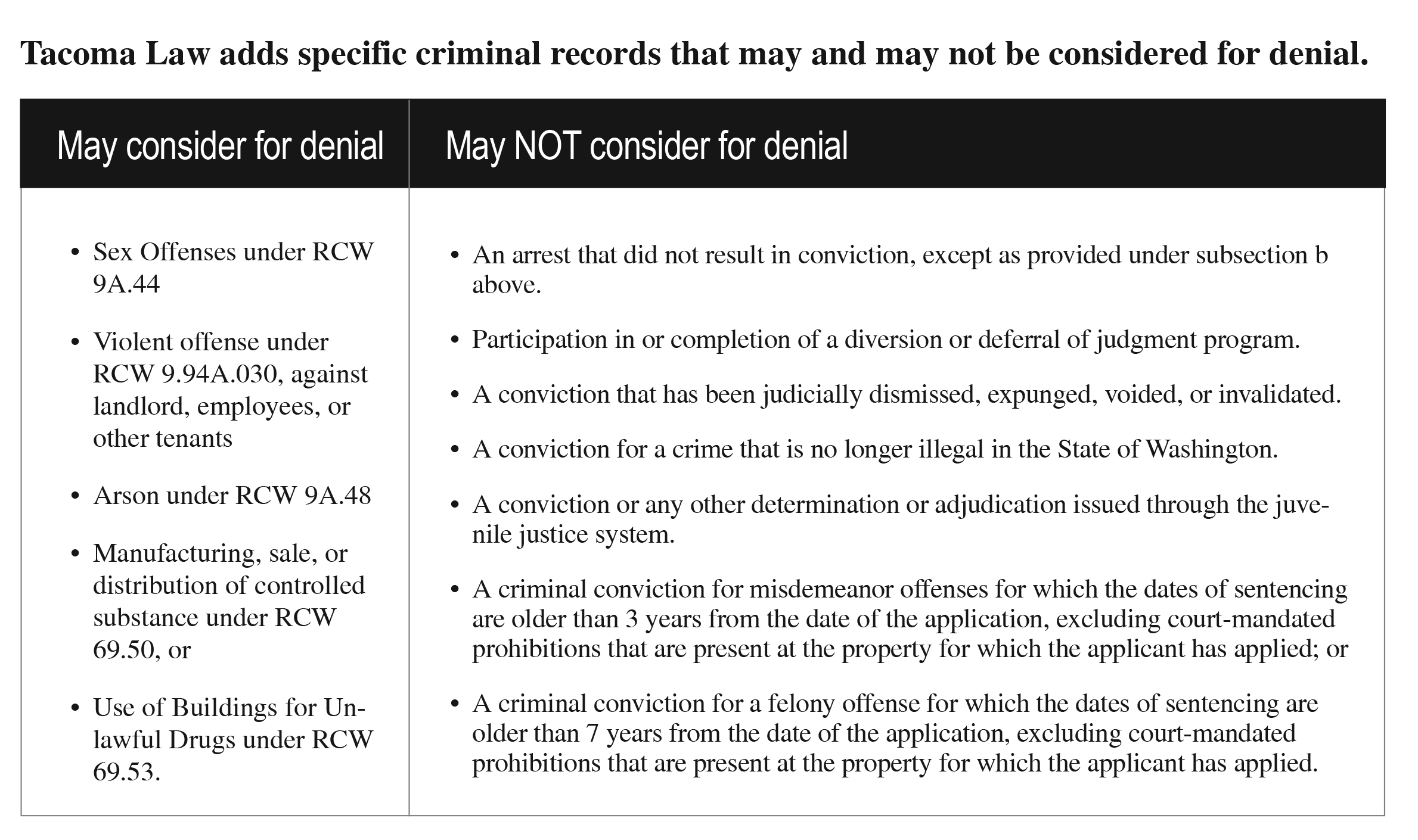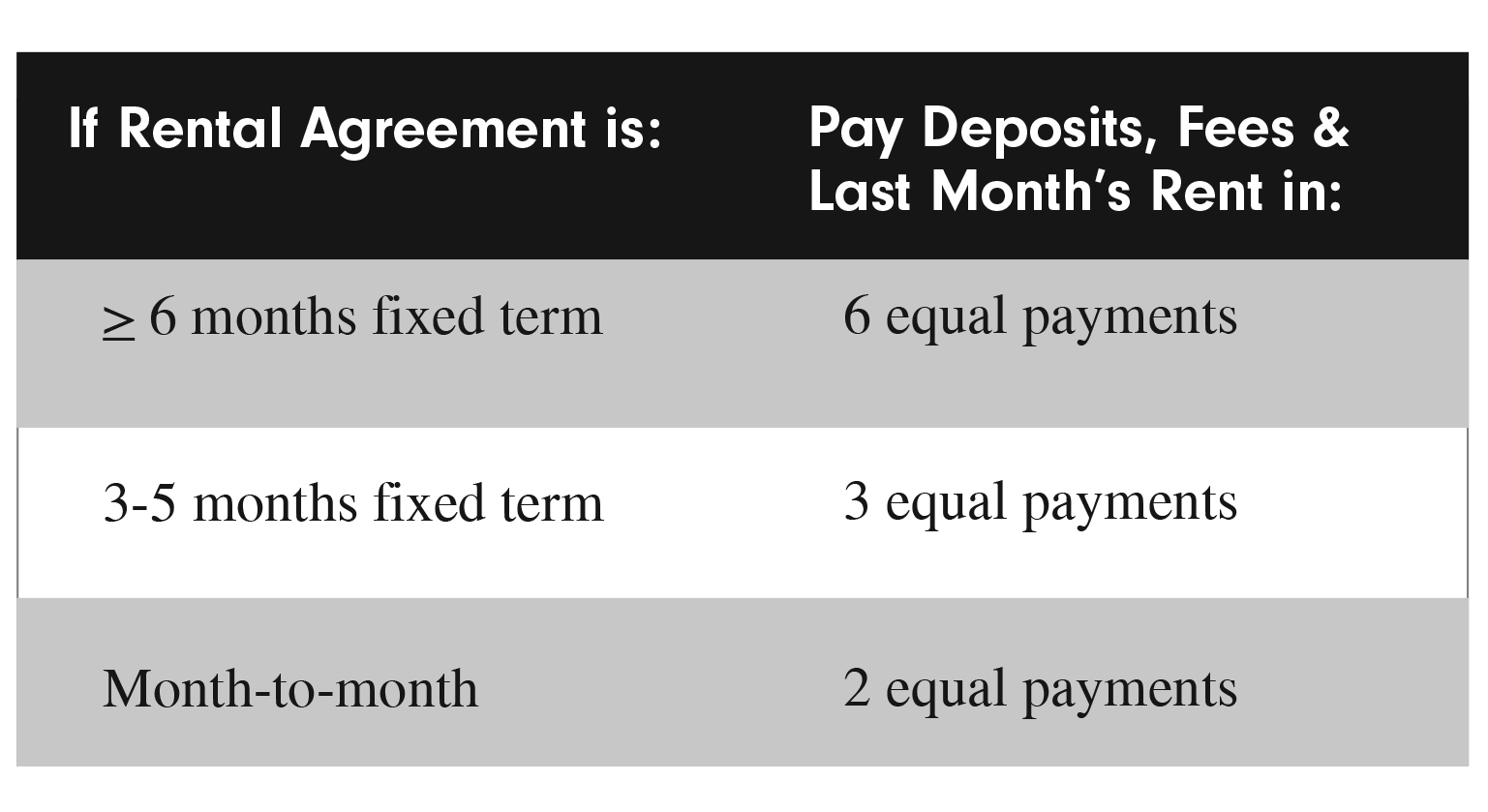Learn About Changes to Tacoma Law
Because this is an especially hot topic, we are rerunning a recent article summarizing Tacoma Rental Regulations, calling attention to the unnecessary ballot measure you will see in the general election on Tuesday, Nov. 7. Note that in August when we last ran this summary, there were to be two similar measures on the ballot. This has changed … there will now only be one. If passed, this measure will undo much of the thoughtful work done by city council members that were at least vetted by community and industry professionals. In addition to piling excessively burdensome duties onto housing providers, this measure would make it nearly impossible for landlords to provide safe housing because it protects dangerous bad actors from eviction.
Measure No. 1 requires the landlord to comply with health and safety standards before eviction or raising rent; limits on fees, two notices to increase rent, relocation assistance for increases of 5% or more, limits on eviction of students, service members, seniors, etc. If voters choose this measure, the rental code will be amended, repealing parts of Ordinance 28894.
See https://www.cityoftacoma.org/ and look for updates on rental housing.
See https://www.cityoftacoma.org/whats_going_on/facts_on_the_rental_housing_ballot_measures.
If you want to learn more about new and old Tacoma rental laws, watch our Tacoma Rental Regulations class on demand at your convenience. RHAWA Legal Counsel, Chris Benis leads this 90-minute Zoom class, reviewing the entire Tacoma Rental Housing Code, including recent additions and revisions. Simply subscribe to our extensive On-Demand Library at rhawa.org/products/classPasses. Select the monthly subscription for $25/month or a heavily discounted annual subscription for $120/year. Our On-Demand Library is jam-packed with over a hundred valuable class session recordings and is exclusively available to RHAWA members.
This summary article below is also available in our online Support Center found at rhawa.org/support-center.
City of Tacoma Law Summary
TMC 1.95 with an Ordinance effective 7/24/2023 created additional tenant rights in the City of Tacoma. This ordinance applies to all tenancies governed by RCW 59.18 (Residential Rentals) and includes regulations on the following:
• Information for Applicants
• Information for Tenants
• Use of Social Security Number in Screening
• Use of Criminal History in Screening
• Determining Financial Responsibility in Screening
• Rental Agreement Regulations
• Setting Occupancy Limits
• Move-In Cost Caps
• Move-In Cost Payment Plan
• Notice to Increase Rent
• Late Rent Fee Cap
• Notice to Terminate Tenancy
• Tenant Relocation Assistance
• Shared housing Regulations
Information for Applicants
Written rental criteria and other information must be provided to all applicants, including:
• That tenant has right to pay move-in costs (fees, deposits, last month rent) in installments.
• City of Tacoma Tenant Resources webpage that provides information on properties and landlords:
o https://www.cityoftacoma.org/cms/one.aspx?pageId=167941.
o Or if prospect cannot access online information, provide hard copy of your property info found at https://tacomaopendata-tacoma.hub.arcgis.com/.
• That social security number will be requested but not required (details below).
• How criminal history will be assessed under new Tacoma law (details below).
• Minimum income requirements in compliance with new Tacoma law (details below).
Information for Tenants
A Tenant Information Packet is provided by the City of Tacoma and can be downloaded from their webpage, Landlord Resources. Landlords must provide an initial distribution to the tenant or prospective tenant when offering a lease as a hard copy with a receipt signed by the tenant. Landlords must also distribute at renewal and upon revision by the City (electronic copy is OK) and with any notice to a tenant under RCW 59.12.030.
The City of Tacoma has also created a form tenants can use to request payment plans for move-in costs. Landlords must distribute this form to prospective tenant/tenant when offering a lease.

Use of Social Security Number in Screening
• A landlord shall not require that any tenant, prospective tenant, occupant, or prospective occupant of rental property provide a social security number.
• A landlord may request and must accept alternative proof of financial eligibility such as portable screening reports, Individual Taxpayer Identification Number (ITIN), or other proof of income, where available, if offered by the tenant.
• A landlord must offer the same rental agreement terms to the applicant offering alternative proof as if a social security number was provided.
Use of Criminal History in Screening
Individualized assessment of criminal records is required per HUD and WA Guidelines. See the article, Screening for Criminal History.
Determining Financial Responsibility in Screening
For groups, the prospective tenants have the right to decide who will apply as the financially responsible party(s) and who will be considered an occupant with no financial responsibility.
A landlord may not screen “occupants” for financial responsibility, only for the conduct, care of property and rules compliance.
The income-to-rent ratio used by landlords to qualify potential tenants will be determined by Tacoma law and HUD Fair Market Rent (FMR) as follows:
• If the offered rent is below FMR, the minimum income criteria can be up to but no higher than three times the rent.
• If the offered rent is at or above FMR, the minimum income criteria can be up to but no higher than 2.5 times the rent.
The landlord must consider all combined income of financially responsible tenant(s) following WA State source of income law (RCW 59.18.255).
Rental Agreement Regulations
Any residential rental agreement (including a renewal) entered into after 7/24/2023 is prohibited from:
• Including any penalties or charges for tenant ending a month-to-month tenancy with proper notice. No “minimum” stays can be enforced.
• Requiring a tenant to pay rent electronically.
• Requiring a tenant to provide more than a 20-day notice to terminate tenancy.
• Regulating or banning dogs based on dog breeds. Exception: A “pet” may be denied if landlord insurance policy requires such ban.
• Using money collected for last month’s rent for anything other than last month’s rent.
Any residential rental agreement (including a renewal) entered into after 7/24/2023 must include:
• A description of the number of occupants allowed to occupy the unit as outlined in TMC 2.01.060.V. (details below).
• A description of any uninhabitable spaces such as attics, basements, and garages that have not been properly permitted for occupancy.
• The name and physical address of the landlord or representative who resides in WA State where notices can be served.
• A description of the tenant’s right to alternative rent payment date based on date of government program income.
Setting Occupancy Limits
The maximum number of residents of each dwelling unit shall not exceed the gross area divided by 200, rounded to the nearest whole number. Bedrooms will accommodate two persons with a minimum size of 70 square feet, with no dimension being less than seven feet. An additional 50 square feet per bedroom shall be provided for each person in excess of two. Children less than one year of age shall not be considered in applying the above provisions.
Example calculations for a 3 bedroom, 1450 sf home.
• 1450 sf ÷ 200 = 7.25, rounded to 7
• 2 per bedroom = 6
Maximum occupancy is 6 people over the age of one year. Any children one year or younger are not restricted.
Move-In Cost Caps
A landlord may not charge more than 25% of rent for a pet deposit. Anything not applied toward damage by the pet must be returned at move out.
Move-In Cost Payment Plan
Reinforces state laws regarding deposits and other move in charges, but with more generous minimum installment terms. The same as state law, there is no installment required if the total of deposit and fees does not exceed 25% of rent; and if prepayment of last month’s rent is not required.
Landlord must inform all applicants of their right to pay move-in costs on installments and they must provide tenant with installment payment form created by the City of Tacoma at the time lease is offered.

Notice to Increase Rent
• A landlord must give tenant 120 days’ notice to increase rent by amount.
• The increase notice must specify the percentage of increase, the amount of new rent, and the effective date.
• The notice must be served in accordance with RCW 59.12.040.
• Must provide City of Tacoma Tenant Resources webpage when notice is given.
o https://www.cityoftacoma.org/cms/one.aspx?pageId=167941;
o Or if tenant cannot access online information, provide hard copy of your property info found at https://tacomaopendata-tacoma.hub.arcgis.com/.
• The rental property must be in compliance with City business license requirements. (TMC 6B) before landlord may serve notice.
Late Rent Fee Cap
• Late rent fees are limited to 1.5%, not to exceed $75 per unpaid month of rent.
• No other charges for late rent are permitted, including notice service or legal costs.
• A landlord must provide tenant with written notice outlining late fees and how to come into compliance at least once per quarter.
• Notice of late fees must include detailed information of all that is owed.
• No late fees on non-rent charges are permitted.
Notice to Terminate Tenancy
Tacoma law on terminating tenancies is mostly the same as WA State law (RCW 59.18.650).
• The rental property must be in compliance with City business license requirements. (TMC 6B) before a landlord may serve notice.
• All notices must include the stated reason for or condition(s) justifying the termination of tenancy.
Tenant Relocation Assistance
When giving 120-day notice to terminate month-to-month tenancies due to substantial rehabilitation, renovation, demolition, or change of use, a landlord is required to provide tenants with a Relocation Assistance Packet. A tenant meeting is required upon request. For further details on the relocation assistance program, see https://www.cityoftacoma.org/government/city_departments/equity_and_human_rights/rental_housing_code/relocation.
Shared Housing Regulations
• All shared housing agreements must be in writing and in compliance with TMC 1.95. 037.
• A landlord or master lease holder renting to four or more tenants in a dwelling unit must have a separate rental agreement for each “habitable space.”
• A master lease holder must exchange contact information between property owner and all subtenants.
• Landlords and master lease holders must both comply with Shared Housing Regulations.
• Landlords and master lease holders must each investigate any complaints of crime on the rental property.
• Landlords must serve any notices to end tenancy to master lease holders and provide enough copies for all other occupants.
o Master lease holders must then serve notices to all other occupants.
o Landlord still ultimately responsible for eviction.
Formal legal advice and review is recommended prior to selection and use of this information. RHAWA does not represent your selection or execution of this information as appropriate for your specific circumstance. The material contained and represented herein, although obtained from reliable sources, is not considered legal advice or to be used as a substitution for legal counsel.

